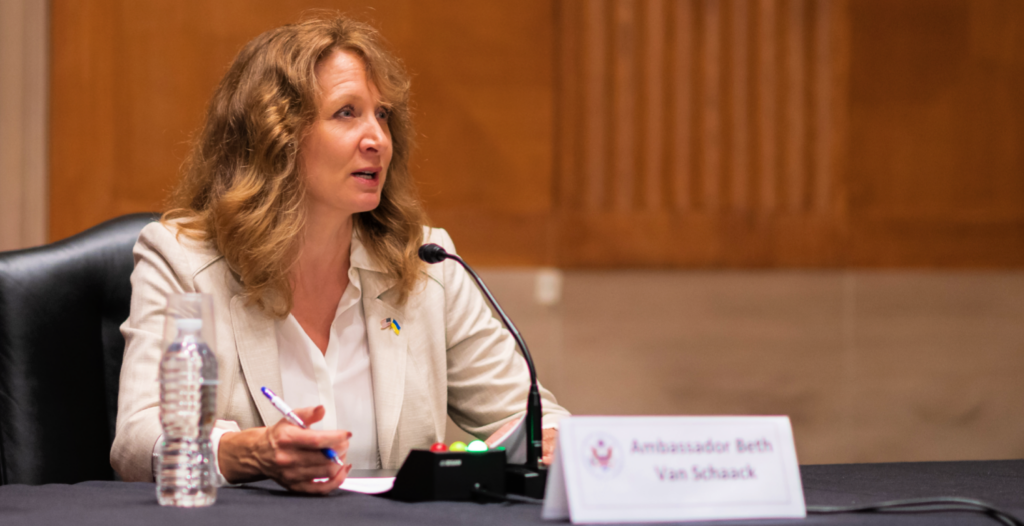WASHINGTON – “The Clinton Administration has, for the past few years, refrained from any criticism or challenge of the policies of President Yeltsin in the fragile hope that this will enhance the prospect that democracy and civil society will prevail. Unfortunately, strains of democracy and civil society have been drowned out by the sound of tank treads moving over the countryside of Chechnya,” said Commission on Security and Cooperation Chairman Rep. Christopher H. Smith today at the Commission hearing “The Chechen Crisis and Its Implications for Russian Democracy.”
“The Russian Government is applying indiscriminate force far out of proportion to its stated objectives in Chechnya,“said Smith. “As was the case four years ago, thousands of innocent persons are being killed or displaced by the Russian offensive.” Smith commented, “Any country, including the Russian Federation, is justified in using appropriate methods to combat terrorism. However, launching a war against innocent civilians is another matter. Russia is a participating State of the Organization for Security and Cooperation in Europe (OSCE) and has agreed to certain standards regarding the protection of citizens when addressing internal security matters.”
“Ironically, the leaders of the 54 OSCE countries are preparing to assemble shortly in Istanbul for the final major summit of the century,” said Commission Co-Chairman Senator Ben Nighthorse Campbell (R-CO). “The horrific humanitarian disaster unfolding in Chechnya will loom large over that important meeting. While none should discount that threats posed by terrorism in the North Caucasus, neither should that serve as a pretext to use force against non-combatants and civilian populations.”
Ranking Commissioner Rep. Steny H. Hoyer (D-MD) lamented, “The policy is not only murderous, but incredibly short-sighted. However it may have been planned, the war in Chechnya has not only become an attack on innocent non-combatants, but it will strain the fabric of Russia’s democratic development, to say nothing of the financial resources that could be used to build up a society, rather than destroy it.”
“There is a major humanitarian disaster underway in the Caucasus,” said Lyoma Usmanov, the Representative of Chechen Republic to the United States. “Hundreds of civilians have already been killed in Russian air and artillery attacks, mostly women and children, and thousands have fled to neighboring regions. As these regions are completely unequipped to cope with this influx of refugees, the scale of the disaster will grow exponentially as colder weather sets in. Neither the Chechen nor the Russian Ingush governments are capable of preventing this unfolding tragedy, affecting those most vulnerable in our society; the elderly, women and children.”
Professor John Dunlop, senior fellow at the Hoover Institution said, “It is my conclusion that this campaign of terror against Chechen civilians has been fully intentional on the part of the Russian military, Prime Minister Putin and President Yeltsin. Its principal aim appears to have been ethnically to cleanse hundreds of thousands of Chechens from their home republic, in what resembles a repeat performance of the Stalinist deportation of 1944, which eventually resulted in the Chechens losing 20-25% of their populace.”
Journalist Yo’av Karny noted, “The Chechens do not deserve capital punishment on the account of [their] flaws. Their quest for independence is no less legitimate, no less warranted by a history of struggle, than that of any people I know of. “Chechnya’s fate has been ignored too often by the outside world. Their own holocaust, which coincided with that of the Jews in Europe, is still awaiting world recognition and Russian repentance. It is our moral duty to make sure that this tiny and stubborn nation does not perish.”
Fiona Hill of the Eurasia Foundation commented, “The peace the Khasavyurt Accord brought proved to be as unpopular as the war it ended, and the Accord is now nothing more than a glorified cease-fire document.” She said, “Sympathy for the Chechens rapidly dissipated both in Moscow and in the surrounding region of the North Caucasus [following the 1994-96 war] in the face of widespread and blatant kidnapings, assassinations, murders, and attacks on economic targets in neighboring areas.”
Most importantly, Hill said, “This Second War is all about politics in Moscow in the run up to the December 1999 Russian parliamentary and the June 2000 presidential elections, and all about defeat in the first war. In October 1995, in the face of persistent Russian military reversals and an increasing public backlash against the war, Boris Yeltsin described Chechnya as the biggest mistake of his Presidency. This is now a chance for the Yeltsin regime and the Russian military to fight the war again––and this time to do it right and correct that mistake. It is also an opportunity for a victorious little war to propel the regime’s designated successor to Yeltsin––Prime Minister Vladimir Putin––up the popularity polls and into the presidency in June 2000.”
Ms. Hill offered the following recommendations: “We must continue to condemn attacks on the civilian population of Chechnya, and highlight the humanitarian tragedy and the threats to democracy in Russia posed by the press blackout. We must engage those Russian politicians who are beginning to speak out against the civilian casualties and the conduct of the War and stress the importance of negotiations. We should encourage the renewed engagement of the OSCE in the region given the positive role that this organization played in the first war, and should offer humanitarian assistance for the refugees and the neighboring republics that are hosting them.”





